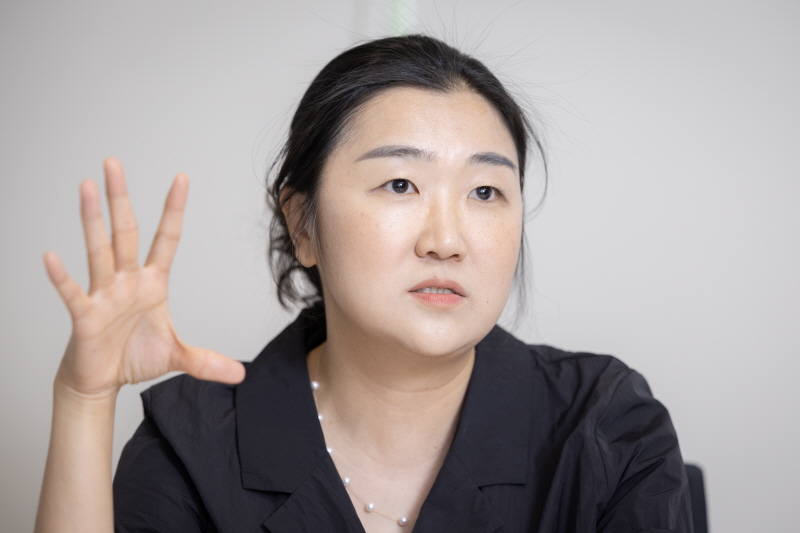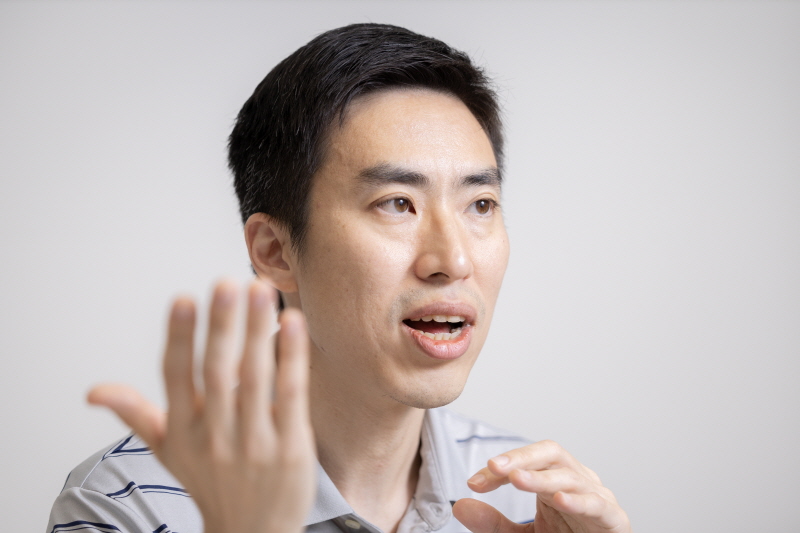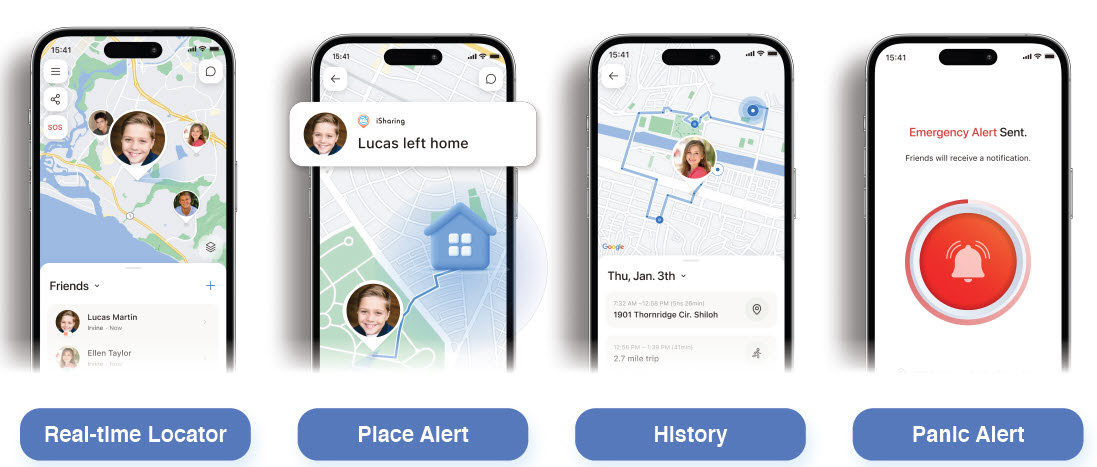The Korean Movie “Extreme Job,” which features a police narcotics team running a fried chicken restaurant undercover, brought attention to the tracking app “iSharing.” In the film, Detective Yeonsoo Jang (played by Hanee Lee) uses the app to locate kidnapped Detective Bongpal Ma (played by Seonkyun Jin).
While iSharing might seem like just another tracking app, it has been downloaded by 45 million people across 225 countries, making it the top service in South Korea, Japan, Russia, and Vietnam. What many might not know is that this app was created by a Korean working couple.
Reese Haekyung Cho (43), CEO of iSharingSoft, and Yongjae Chuh (43), CTO, were working at Dongwha Duty Free Store and TmaxSoft respectively when they decided to embark on app development.
In 2010, Chuh developed iSharing as a side project, which soon gained popularity. By 2016, they moved to the United States to expand their global business. Despite being a small startup with only 10 employees, including its co-founders, iSharingSoft exceeded 10 billion won ($7.2 million) in revenue last year. How did this ordinary Korean couple achieve success in the competitive world of tracking apps?

The JoongAng Ilbo, a leading Korean newspaper affiliated with the Korea Daily, met with Cho and Chuh at a shared office in Gangnam-gu, southern Seoul, during their visit to South Korea last month.
From Working Couple to Entrepreneurs
In 2007, Apple co-founder Steve Jobs demonstrated finding a nearby Starbucks using Google Maps at the Worldwide Developers Conference (WWDC). This revolutionary moment has since become a routine part of everyday life, and it also changed the lives of Cho and Chuh.
– What motivated you to start this business?
Cho: “After watching Steve Jobs in 2007, I felt inspired to pursue something related to location tracking. As we were planning to have children, their safety became a priority. Every parent worries about their child’s well-being, wondering if they’ve arrived at school safely or if they’re not wandering off after class. My husband, a developer at TmaxSoft, started coding as a hobby. Using our own money, he developed the program after work hours. By January 2011, we launched iSharing, a child tracking app, on the Apple App Store.”
– How was the initial response?
Chuh: “At first, not many people downloaded the app, and some location tracking apps faced criticism over stalking concerns. However, word-of-mouth among parents helped it gain popularity. Demand surged in South Korea, particularly after the 2012 Wonchoon Oh murder case, and it became known as a must-have app for travelers and for finding lost phones. By 2015, without significant marketing, we had over a million users.”
– The app business was in its early stages in 2011. What led you to commit to it?
Cho: “At that time, it wasn’t common knowledge that you could generate revenue from app users. However, we saw the global potential of apps just by being on the App Store. In 2015, we established a legal entity in the United States and started our business in earnest, believing that success in the U.S. would lead to global success.”

– How did you fund the initial stages?
Cho: “We funded it with my husband’s salary. He joined us in the U.S. a year after we set up the company there, during which time I traveled to places like the U.S., U.K., and China seeking investment opportunities.”
Learning from the best experts
In 2015, Cho participated in Korea Trade-Investment Promotion Agency’s “Creative Startup Korea” event to attract investment. There, she met a key investor who changed iSharing’s fate.
-Why did you approach those with ‘red badges’?
Cho: “Global investors wore red badges. In a corner where no one came, I would approach anyone with a red badge and ask them to listen to our story. One of these investors was Murat Aktihanoglu, Co-Founder and Managing Partner of the Entrepreneurs Roundtable Accelerator (ERA) in the U.S., which is as well-known in New York as Y Combinator, led by Sam Altman at that time, is in Silicon Valley.”
– How did you convince Murat?
Cho: “Murat was impressed that we had over a million users through word-of-mouth without spending on marketing. As an expert in location-based services, he took an interest in us. ERA selects only ten teams from around the world per program, and we were the first team from Asia to be selected, with a competition rate of around 200 to 1. In 2016, ERA invested in us.”
– How much did you receive?
Chuh: “We received $40,000. Unlike many startups, we haven’t needed additional investment as our business model quickly took root, allowing us to achieve our goals through our own revenue. As a result, we haven’t sought further investment, and this remains true today.”
– What was your initial business model?
Cho: “While the download was free, premium features required a subscription of $7.99 (10,000 won) per month or $69.99 per year. Free users could add friends and check locations, but accessing location history or receiving location alerts required a subscription. Users particularly liked the location alert service, which provided notifications when their children went to or arrived at school, when their friends were nearby, or when their elderly parents living alone didn’t move for a certain period. Our paid users currently exceed 100,000 across 90 countries as of June, with projected revenue of 15 billion won this year from subscriptions alone.”
– What did you learn from ERA that helped in your early growth?
Chuh: “ERA taught us to set key performance indicator (KPI) and prioritize tasks, focusing on one thing due to limited resources. As a developer, it’s easy to get fixated on enhancing technical aspects, but we learned to concentrate on attracting users.”
Cho: “ERA had over 300 mentors with extensive experience in starting new businesses. We consulted various experts in marketing, business, and design to establish a foundation as a global service company. Our dedicated mentor, Philip Neches, founder of Teradata, guided us through early challenges. We met with him over twenty times and shared our difficulties. His advice to continually test pricing in new markets was invaluable, as was his emphasis on the importance of perseverance.”
– Why is your headquarters in Irvine, California?
Cho: “New York was quite cold (laugh). After six months in New York, we moved to Irvine for its warm weather, safety, excellent educational environment, and lower cost of living compared to Silicon Valley. This helps us attract talented Korean professionals.”
Reason the DEA approached iSharing
– What differentiates iSharing from similar apps?
Chuh: “Tracking apps must operate 24/7, necessitating low battery consumption. We developed a unique battery-saving patent, utilizing smartphone sensors like gyroscopes and accelerometers to detect movement, reducing GPS use when stationary. This allows our app to run continuously using only about 1% of the battery, with precision to detect even minor movements like crossing a street.”
– Smartphones also have tracking features. How do you stand out?
Cho: “When big tech companies introduce similar features, it inadvertently promotes our app. Many users switch to our app from Apple’s location services because we offer social features and don’t require mutual location sharing. Similar to how people use KakaoTalk or Line instead of iMessage, our app provides additional benefits.
– What sets your business apart from others?
Cho: “Technology alone doesn’t guarantee business success. It’s crucial to thoroughly analyze the user base and market to allocate resources efficiently. For instance, we calculate the Customer Acquisition Cost (CAC) for each new customer. In countries where this cost is high, we invest heavily upfront to maximize the word-of-mouth effect. Additionally, we strive to maintain a high app store rating (iOS 4.8 in the U.S.), which helps us rank higher in keyword searches and increases our visibility among users.”

– Does your service integrate AI?
Chuh: “We plan to launch several AI services by the end of this year. One example is a feature that alerts friends if a user suddenly takes an unfamiliar route, which can be crucial in situations like kidnappings or unexpected accidents. The AI needs to learn the user’s frequent routes to detect unusual patterns. We also aim to provide alerts for navigating around disaster areas, such as tsunami warnings, by identifying safe alternative routes.”
– Your service is available in 225 countries. Are there any unique trends?
Cho: “In countries like Russia and Japan, teenagers often use our app as a social media platform. They can chat with nearby friends or view each other’s locations in real time. In the U.S., there are cases where college students living in dorms use our app to track the current location of friends who are running late to class.”
– How many employees do you have?
Chuh: “Including the two of us, we have a total of ten employees. Our team consists of four developers, and we have one person each for marketing, customer service, design, and B2B management. Ten years ago, we would have needed nearly 100 employees. Now, with tools like ChatGPT for design, marketing, and coding, and big tech cloud services for server management, we operate very efficiently with a small team. This allows us to quickly develop and test services in the market. As a result, we don’t conduct public hiring. Instead, we selectively bring in experienced professionals with over ten years of industry expertise. We emphasize our company’s stable financial status and growth potential to attract top talent, offering competitive salaries and the best health insurance for their families. This strategy was advised by our dedicated ERA mentor, Neches.”
– Any unique stories involving your app?
Cho: “The U.S. Drug Enforcement Administration (DEA) once caught a member of a Mexican cartel using our app and requested cooperation to track the entire cartel. While we couldn’t share personal data, we learned the cartel member’s family used our app, aiding the investigation.”
The Future of iSharing
iSharing’s new cash cow is its business-to-business (B2B) data services, catering to the growing demand for precise location data.
– What is your data business about?
Chuh: “Interest in location data surged post-COVID-19 for tracking patient movements. We provide highly accurate location data, rivaling only Life360 in the U.S. Companies like Accenture use our data for optimal cell tower placement, and Placer, a big data analysis company, uses it to identify prime commercial real estate locations. Due to the vast size of the U.S., there is significant demand for such data, as entrepreneurs seek areas with high foot traffic, even when considering opening a Starbucks store. We also plan to supply data to Appen, an Australian data labeling company.

– Isn’t this personal information?
Chuh: “We provide aggregate data, excluding personal details such as names, phone numbers, or email addresses. For minors, we don’t collect any data. We regularly receive audits of our practices from Outlogic to ensure compliance with global privacy laws.”
– What are your long-term goals?
Cho: “We aim to be number one in every market, currently holding the top spot in many but still behind Life360 in some. With 3 million monthly active users, our goal is to reach 100 million. This might seem ambitious, but as a global service needed by families worldwide, we believe it’s achievable. More data will also increase demand for our services.”
BY KWANGWOO KANG, YOUNGNAM KIM [kang.kwangwoo@joongang.co.kr]




